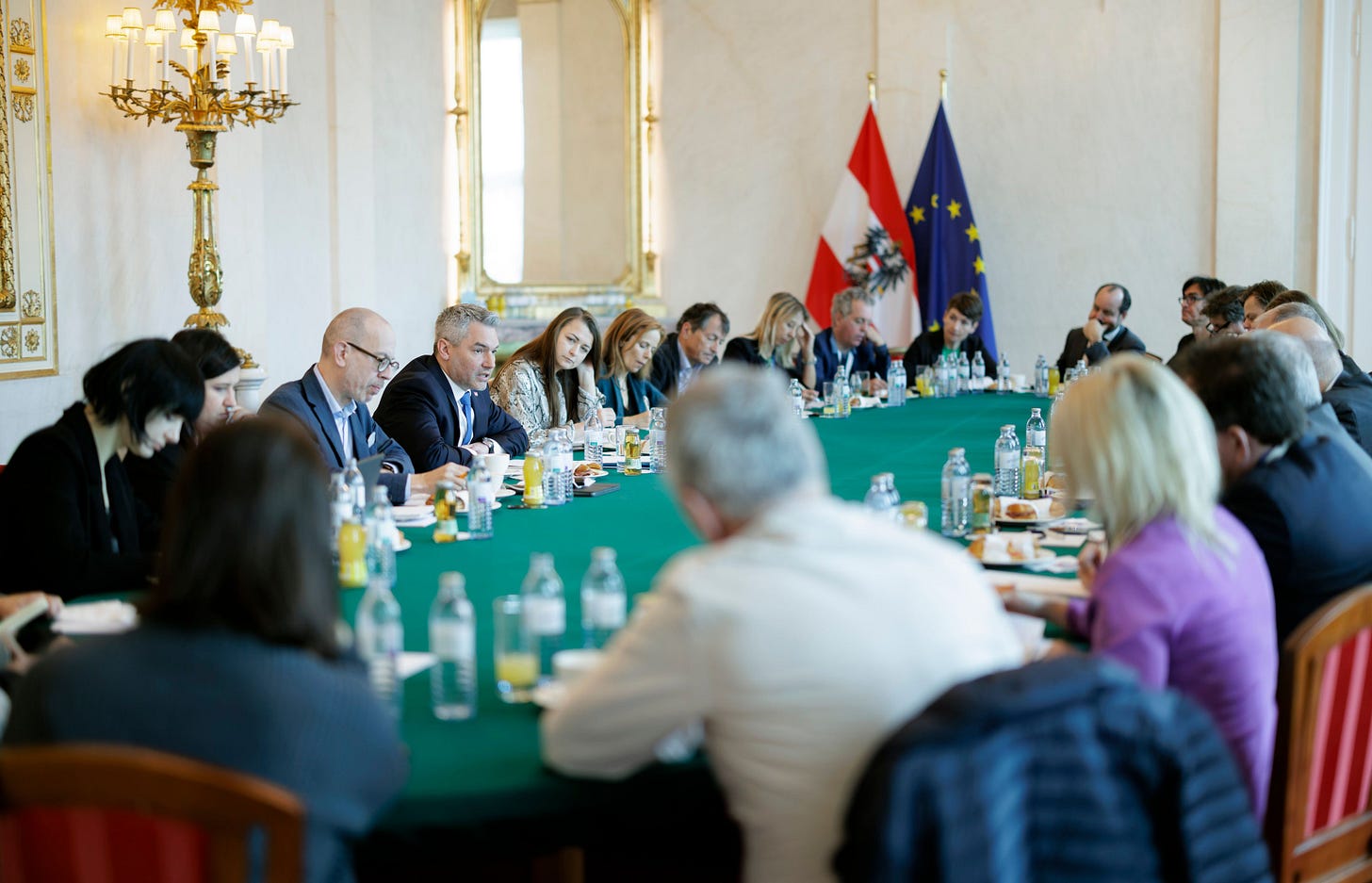He Was The Future Once
Chancellor Karl Nehammer used an address last week to re-introduce himself to voters and outline his vision for the future of Austria

Servus!
Since becoming chancellor in December 2021, Karl Nehammer has led Austria from crisis to crisis: the coronavirus pandemic, Russia’s invasion of Ukraine, and the interwoven energy, inflationary, and cost-of-living crunches. He also inherited a party, the conservative People’s Party (ÖVP), bedeviled by corruption allegations and investigations. Under such conditions, Nehammer has been unable to define himself in the eyes of voters. As such, with legislative elections around 18 months away, Nehammer used a keystone speech last week to, as Martin Kotynek wrote in the Standard, come out of his defensive crouch and outline his vision for Austria’s future.
Nehammer is no gifted orator or political dreamer. His speech as a whole amounted to less than the sum of its parts. It was a potpourri of policy proposals that did not point towards a clear goal. Some measures were well-intended. Media literacy among the young—though not the young exclusively—is a real issue, and free e-paper subscriptions for teenage school pupils could be one way to address that. Austria also has a tight labor market, and to that end, Nehammer pledged to recruit an additional 800 public doctors and introduce a work mandate for those who study medicine in Austria.
Other ideas, however, were obvious non-starters. Nehammer proposed that migrants should only be able to access entitlements after five years residence in Austria. That would hardly make Austria an attractive destination for migrant workers, but more importantly, a previous attempt by the ÖVP to index child benefit for EU workers in Austria was overruled last year by the European Court of Justice (ECJ) as a form of “indirect discrimination.” It seems evident that further efforts to create a two-tier entitlements system would fail at the same judicial hurdle or perhaps in Austria’s own constitutional court.
It was pure populism, as was Nehammer’s determination to vote against an European Union phaseout of gas-powered motor vehicles by 2035. When times are tough, politicians across the continent have long used the EU as a punching bag, and Austria’s—Nehammer included—are no different. The chancellor said his ‘no’ vote would be in the service of the country’s automotive industry, which employs tens of thousands of workers, but it should go without saying that that sector has no future if it dismisses the transition to e-mobility. Ditto the country—and the planet.
Home ownership, gas-powered cars, reduced benefits for migrants, superfluous swipes at Europe and contemporary gender politics: Nehammer’s speech was less an appeal to the entire nation than a narrow section of the Austrian electorate, one that stands to the right of center politically and resides outside of Austria’s cities. Consider here the most recent Profil poll, which had the ÖVP in third on 22 percent behind the far-right Freedom Party (FPÖ) on 31 percent and the Social Democrats (SPÖ) on 25 percent. An ÖVP comeback would logically begin by rebuilding moral among the party’s base by giving them something to vote for.


If we think of this as the first draft of the ÖVP’s 2024 manifesto, then it also signals that the age of the ÖVP-Green coalition is over. Such a coalition looks to be a mathematical impossibility in any case—the two parties together are now polling at 32 percent—but the Greens would never agree, for example, to a two-tier benefits system or vetoing a ban on gas-powered cars. Such a conservative speech rather indicates that, in looking to the future, the ÖVP realizes its path to power runs not through the left or the center but the right. Nehammer’s speech was more back to the future than anything else. In spite of the obvious obstacles in its path (see under: Herbert Kickl), it seemed to lay the groundwork for another coalition with the FPÖ.
Bis bald!
Thank you for subscribing to the Vienna Briefing. If you know someone who might also be interested in receiving this newsletter, consider sharing it with them today.
The Vienna Briefing is a free newsletter. If you enjoy and would like to support my work, think about sending me a tip via PayPal. Thank you to all those who have contributed.
Terror Attack Feared
Fearing a planned Islamist terror attack, Vienna’s police increased its visible presence in the capital this morning. Austria’s intelligence services believe Christian places of worship may be targetted.

Doskozil Puts Up
Hans Peter Doskozil announced yesterday he intends to challenge the incumbent Pamela Rendi-Wagner for the SPÖ leadership. Doskozil said he wished for the leadership question to be put to a vote of party membership.
Simon Wiesenthal Prize Awarded
The 2022 Simon Wiesenthal Prize's main prize for civic engagement to combat antisemitism and to educate the public about the Holocaust has been awarded to Zikaron BaSalon. The Israeli initiative convenes informal gathering in people’s homes at participants listen to Holocaust survivors’ testimonies.



